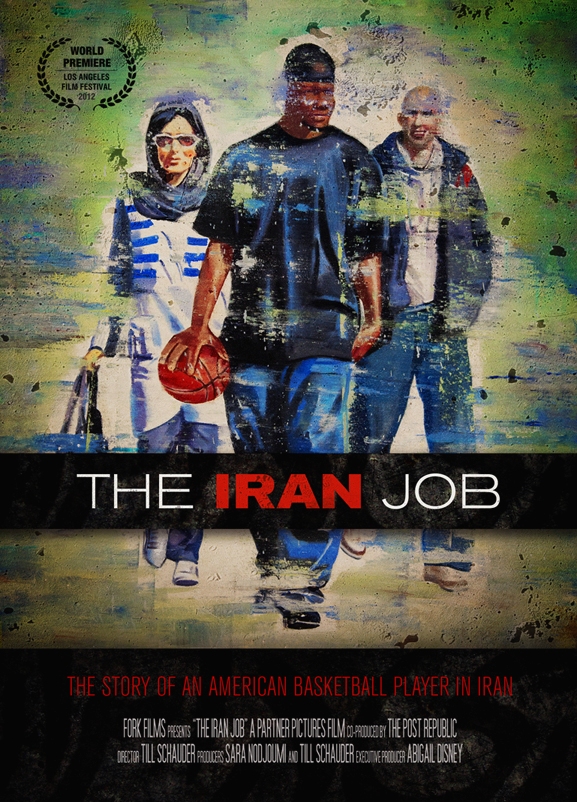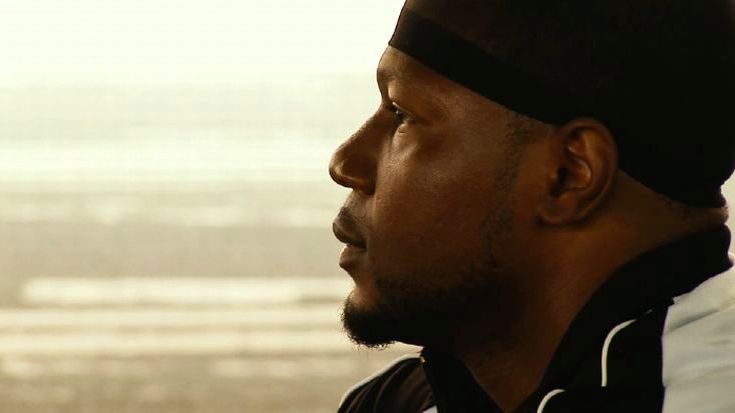
Lots of entertaining, funny material in this one. Trust me. The Iran Job is a new indie documentary (opening Friday, September 28th in select cities) about how one-time NBA hopeful Kevin Sheppard took an overseas job to play hoops in the Iranian Super League for the team A.S. Shiraz. Quick: Did you even know Iran had a professional basketball league? Sheppard once had work-outs with the Atlanta Hawks, but found himself playing in various countries like Brazil, Venezuela, Spain, China and Israel. Many of his friends and family balked at the potential dangers Sheppard would encounter in Iran, but when he went he found himself instantly welcomed and idolized by the people. Not the mention the crush of three Iranian ladies who befriended him in secret.
Sheppard met with me one-on-one in Los Angeles to talk with me about his experiences there and with the film, which he said he was first reluctant to do.
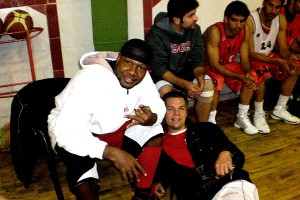 When did you first see a basketball game?
When did you first see a basketball game?
Kevin: I was probably six. I started playing well, right away.
Where would you play?
Kevin: We would play at the park. I remember sitting down watching the bad boys of Detroit Pistons – my team – Joe Dumars, Isaiah Thomas, the Microwave Vinnie Johnson – I used to love the Microwave, he comes off the bench give you 15-20 points in three minutes. Bill Lambeer was a crazy man who would take your head off. Then there was Dennis Rodman, the real Dennis Rodman. 1987-1988 they were on top before they were dethroned by King Mike.
What did you think of the Lakers?
Kevin: Back then my whole family was Lakers. But I like to be the underdog, really. It was always the Pistons and Lakers battle. I always loved Magic and Worthy and those guys. But like I said, I wanted to be on the outside. I chose Detroit so I could be a thorn in my family’s eyes. Because everybody was pro-Lakers. Even in the Virgin Islands now, everybody is either Lakers or Spurs. Obviously Spurs with Tim Duncan from the Virgin Islands. Roger Bell also from the Virgin Islands.
When did you first know you were good at the game?
Kevin: I would have to say when I understood how talented I was, it probably was when I got to college at Jacksonville University. I played for legendary coach Hugh Durham. He’s now retired but he coached in Georgia and Florida State, went to the Final Four with both schools. Once I got there I realized he coached Dominique Wilkins and other players that went to the NBA. And he told me I was one of the players he ever coached. It really struck me, ‘Maybe I am really good!’ I started to take it a lot more seriously. When you are young, you’re kind of bashful. Not really understanding what’s really in front of you. All you want to do is just play. But once you sit down, humble yourself, and listen. And take in that this guy has coached so many legendary players. And he says you’re one of his favorite players – I even talked to him two nights ago – and we just chit-chatted and talked about how I was in college. How I’ve grown as a player and as a person. I’ve been truly blessed.
But you never made the NBA?
Kevin: I never made the NBA. I had a couple workouts. I worked out with the Atlanta Hawks in 2007. But the opportunity for a spot was never there. Especially being a six-foot point guard. Which is like a dying art. You need the right opportunity and the timing. And it’s not so much about talent, but sometimes timing is very key. At that time, they had Salim Stoudamire, Tyronn Lue, Anthony Johnson… It was going to be pretty tough to break in to get an opportunity to go to camp with those guys.
Were you good enough in your own perspective to play for the NBA?
Kevin: Yes, I would have been good enough. Because I played those guys overseas all the time. Israel and Spain. I played with the Virgin Islands National team. Bumped heads with those guys all the time. Asked me why I was not in the NBA. I never had the opportunity or the timing.
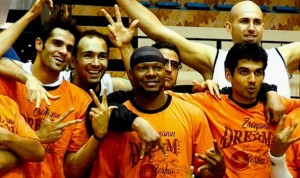 When I was watching “The Iran Job” I thought to myself, I could play in the Super Iranian league if I had just a few months of workouts.
When I was watching “The Iran Job” I thought to myself, I could play in the Super Iranian league if I had just a few months of workouts.
Kevin: The level is low. How the league is set up though, it’s a two-edged sword. The league grooms their national team. All their national pride is from their national team. The top teams can fool you. Their top teams are really good, they have all their National league best players. They made the Olympics. They can’t be that bad if they made the World Championship from the Olympics.
The league is lop-sided?
Kevin: Lop-sided, yes. Four teams are loaded with talent. Which makes it harder on me because my team is not loaded with talent. All the pressure is on me. The rest of the league is just meh. Not even division one. You really get your money when you play those mega teams. Those mega teams are good, they could compete with anybody in Europe.
One small part of your movie I thought was bogus. That if you don’t take the Shiraz to the playoffs, you’d get fired. But I got the feeling that you didn’t care you got fired. You wanted to go to the playoffs for reason of pride?
Kevin: The way we grew up playing in America is different from them. They are satisfied by doing well. We played the big teams and lost by two points. There was rejoice and happiness. Coming from America, a loss is a loss. In fact, if we lost by one or two points it hurts the most because you had the opportunity to win. But these guys are so complacent, so happy just to do good. For us, in the U.S., doing good is winning! I didn’t go to Iran just to do good, I came here to win. You’re seen as a winner, you get more opportunities to play in not just Iran but to play in other countries.
There was no part of you that said, ‘I don’t mind if I lose, because then I’ll get to go back home early?’
Kevin: As far as going home, I knew I wasn’t really going to go home. I know I was one of the better players. Not only in Iran, but also in Europe I had many offers. One of the biggest reasons I chose to play in Iran – the money was really the same but you play less months. If you play six months and make six digits and you go to Europe to play ten months and make six digits… the battle in Europe, even though the level is higher, the wear and tear on your body is going to be so much more. At the end of the day, money and less months.
I think we’re all dying to know how much was your salary to play in Iran?
Kevin: Everybody asks that, but I’ll have to [Laughs] keep that to myself.
OK, next. I think something magical happened in this movie. The Iranian women were very attracted to you.
Kevin: There was a little attraction there, but I always let them know… I’m [attached] married. [Laughs] I had to play down a lot of stuff. One of the biggest things of the attraction – I don’t think it had to do with looks – attracted because of how I approached them. Because they don’t have that kind of communication with men over there. They’re meat to them, really.
Meat?
Kevin: Meat. That’s how the guys view them as. Not like a real person.
You were challenging and stimulating those women on wavelengths they hadn’t had before.
Kevin: Exactly. These guys could not talk to them on that intimate level like I was able to express myself and actually listen to them. I could see they were starving for some type of intimacy than just a sexual conversation.
Some of it comes down to the forbidden aspects. To commingle with a man secretly was exciting to them?
Kevin: Yes, you had to. Because like you said, it was forbidden. They could have got into a lot of trouble if they were caught. Even myself could not understand it I created this scene, not even orchestrated – one of the great things about the film – a lot of it is true. Till Schauder [the director] was invited to come after I had the girls over. And they were so shy. [Imitates shy girl] ‘Are they going to film us?’ [Laughs] They loosened up after awhile –
You loosened them up.
Kevin: I knew what I was doing. Nobody knew I was going to do that, not planned. Oh my God, ‘We’re going to get killed for this.’ For me it was a practical joke. But to them, they taught me it was serious.
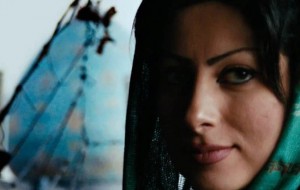 Especially Elaheh. Is she as beautiful in person as she looks on film?
Especially Elaheh. Is she as beautiful in person as she looks on film?
Kevin: Yeah, she’s gorgeous. I’m a lucky man. [Laughs]
I don’t know if you caught it or not. Maybe you’re just walking and being yourself, but there’s a moment where it looked as if – in her body language from behind – she would have loved to hold your hand. That gesture would probably be erotic to a woman in that country, would it not?
Kevin: [Big rolling chuckles] Yep. You hit it on the nail. Yeah, yeah.
You can’t say too much about it because you’re married?
Kevin: Yeah, yeah. [Rolling chuckle]
Who contacted you to be in the film? Or did you contact the director first?
Kevin: [Director] Till’s wife is Iranian, she contacted the team. The plan was to get this American player to do this documentary. They tried to do it from the year before and couldn’t find a participant. When they contacted my team, the coach told me about it. I didn’t want to be taped, like reality TV bulls***.
My Skype friends started joking with me, is what happened. ‘Riding a camel to practice?’ they joked. I keep defending myself. Then… What better way to show them how I’m really living and how these people are – because they make these assumptions – this was my chance to prove their jokes were far off. That’s the reason I did it. Not political. Not even basketball.
The common people of Iran are very nice and friendly in the film. What level of shock was that for you?
Kevin: Honestly, I was not that shocked. In 2005, I went to play in Israel. They have the similar stigma with Israel in Tel Aviv, with people blowing up busses and such. My family was scared for me to go. But Tel Aviv was gorgeous, like New York City. It changed my life how I viewed things. What people say about someone else. When it came to Iran, some of it has to be true. But I have to go see for myself. Once I got there, the people were so… opposite from the government. A lot of what is said about the government is true, they’re crazy. They will come one day, ‘You can’t watch TV,’ or ‘Internet off for a whole month.’ They do crazy stuff like that.
Schizoid divide between government and people?
Kevin: People themselves are familiar to me. They want out of that system they’re in. Millions of people participating in the Green Movement following the election and what took place. I hope the people of the United States see this to understand that the people aren’t locked in with what’s really happening to the country as a whole. As what we might take the country of Iran as evil. The people… they want change.
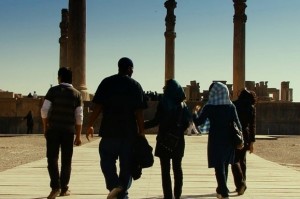 Do you still write to the friends you made in Iran?
Do you still write to the friends you made in Iran?
Kevin: Every once in awhile I email Hilda. I ask them how they’re doing. Hilda is my number one friend, the nurse. Took care of me, very talented young lady. ‘How you doing?’ and ‘Got a boyfriend?’ Ha ha.
When it comes to your career now you’re running a non-profit basketball organization, correct? Are you going to try to go back to the NBA?
Kevin: Right now I have problems in my own country with many kids dropping out of high school. Bad in the Virgin Islands, especially with the economy. Crime has risen. What I do with my non-profit organization is provide a platform for kids to come off the streets and come to play. Once I get their attention, I push them in directions so they stay out of trouble.
That’s your core career currently?
Kevin: Core career, yes. And I’m the head coach for my old high school.
